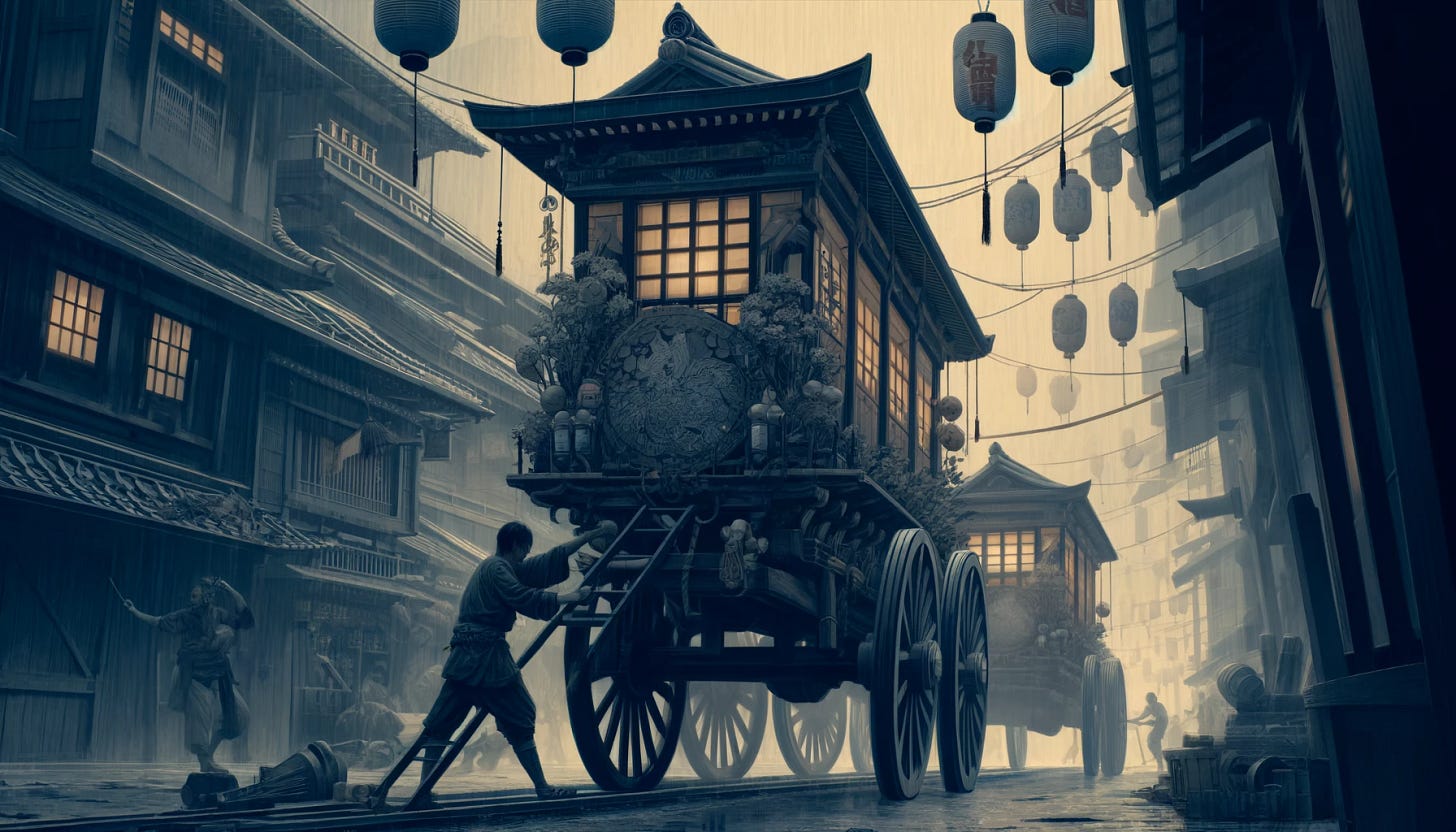On falling off of wagons and getting stuck in ruts
Wisdom from 9 writers on how to get back on the wagon and getting unstuck when you're stuck in a rut
Sometimes I think if there's one thing I've been the most consistent at in my life, it's falling off wagons. In second place would be getting stuck in ruts.
Of course, I mean this metaphorically.
For readers who may not be familiar with these idioms
The expression "falling off the wagon" is used to describe someone who has stopped maintaining a commitment to a particular habit.
The phrase supposedly comes from the late 19th to early 20th century, when people who supported not drinking alcohol would ride on a water wagon during parades to show they were serious about staying away from alcohol. If someone "fell off the wagon," it would visually represent them failing their vow not to drink.
Another theory however is that it might come from prisoners who were moved around in wagons. If a prisoner fell off the wagon, it meant they were trying to escape, and this was attributed to them trying to escape their commitment to sobriety.
Okay before your eyebrows get any higher, I'll clarify upfront: I do not have a drinking problem and am not saying I keep falling off the wagon in the way the phrase originally meant. Over the years, the idiom has become more generalised to mean failing to keep up any habit or practice someone committed to.
But I've fallen - both gracefully and... umm... creatively - off many wagons.
Writing and publishing on a regular schedule
Exercising X number of days a week
All sorts of interesting diets
Maintaining conversation threads and relationships with various people, personally and professionally
Meditation schedules and practices
Learning a musical instrument
Plenty more, I'm sure, that I can't even remember.
Then there's the getting stuck in ruts part of the equation.
The idiom "getting stuck in a rut" describes a situation where someone is trapped in a repetitive and unproductive routine. It's like being stuck in a pattern of behaviour that is hard to change, even if it's not helping you anymore.
This phrase likely comes from the days when roads were unpaved. Wagons and carriages would travel the same routes repeatedly, causing deep ruts to form in the road. If the wheels of a wagon got stuck in these ruts, it would be difficult to steer it anywhere else.
So, when we say someone is "stuck in a rut," we are comparing their situation to a wagon that can't break free from the tracks it's stuck in.
Some examples of ruts people can get stuck in are:
Doing the same job tasks every day without feeling challenged
Repeating the same routines with a partner
Hanging out with the same people all the time and not trying new social activities
Following a daily pattern of work, TV, and sleep, without engaging in hobbies or interests
Staying stuck in the same feelings, like sadness or worry, for a long time
I'll spare you the cringe of listing out all the specific ruts I've been stuck in at various points in my life. You won't get any prizes for guessing either!
You may be wondering, “Why is Dev outing himself here?”
What is the point of painting this picture of me being an incredibly unreliable person with poor discipline and commitment levels?
Well, firstly, I'm not that bad. I'm often harder on myself than in reality is justified.
Does that sound like someone you know?
Someone really close to home?
Someone like... you?
I've learnt over the years (and maybe need to keep re-learning) that most of the time when we fall off of a wagon, we don't fall very far and the wagon isn't moving that fast. It's not that hard to pick ourselves up again, catch back up to the wagon and hop back on.
What tends to weigh so many of us down is an incorrect delusion that getting back on the wagon would require tremendous effort and energy that we don’t have. And more often than not that's a psychological challenge, not a physical one.
Similarly, when we're stuck in a rut, we tend to feel that the wheels are dug in deeper than they actually are. The depth, however, isn't the real challenge. The challenge is momentum.
In order to get out of a rut, you need to firstly stop the motion. Then, get off the misguided wagon with deliberation, and pick the wheels up out of the rut to recalibrate.
It's perhaps not as easy as I'm making it sound, but it is really as simple as it sounds.
But you must... first... stop.
And you have to decide where you want to be moving instead. So, when you get back on the wagon to start moving forward again, you must know what moving in the right direction means for you.
Now how you actually do this can vary tremendously, and has been written about countless times, throughout the ages. So I thought I’d share with you some inspiration and wisdom from notable thinkers and writers more credible than me, on getting yourself out of a rut and back on a wagon you may have fallen off from.
Advice from 9 great writers on getting unstuck
Pema Chödrön - When Things Fall Apart: Heart Advice for Difficult Times:
"Rather than being disheartened by the uncertainty of life, what if we accepted it and relaxed into it? What if we said, 'Yes, this is the way it is; this is what it means to be human,' and decided to sit down and enjoy the ride?"
Pema Chödrön offers a way to deal with psychological ruts through acceptance. Embracing uncertainty can change your perspective on the challenges you face. By accepting that life is inherently unpredictable, you can reduce stress and find peace in the present, making it easier to move forward creatively and emotionally.
Mihaly Csikszentmihalyi - Flow: The Psychology of Optimal Experience:
"The best moments in our lives are not the passive, receptive, relaxing times... The best moments usually occur when a person's body or mind is stretched to its limits in a voluntary effort to accomplish something difficult and worthwhile."
Mihaly Csikszentmihalyi suggests that true satisfaction comes from engaging deeply in challenging activities that absorb our attention fully. When you’re in a rut, look for tasks that challenge you and require your full engagement. These are the moments where you can experience 'flow', escaping the rut by immersing yourself in the challenge.
Gretchen Rubin - Better Than Before: Mastering the Habits of Our Everyday Lives:
“When we do stumble, it’s important not to judge ourselves harshly. Although some people assume that strong feelings of guilt or shame act as safeguards to help people stick to good habits, the opposite is true. People who feel less guilt and who show compassion toward themselves in the face of failure are better able to regain self-control, while people who feel deeply guilty and full of self-blame struggle more.”
When you stumble or fall short of your goals, being kind to yourself is more beneficial than self-criticism. Instead of harshly judging yourself, try to understand what led to the setback and see it as a learning opportunity. This approach allows you to maintain your self-esteem and motivation, which are crucial for bouncing back and continuing your efforts toward your goals.
By fostering a gentler attitude towards yourself, you create a supportive inner environment that enhances your resilience and capacity to stick to your habits, even when challenges arise.
Steven Pressfield - The War of Art:
"The most important thing about art is to work. Nothing else matters except sitting down every day and trying."
Steven Pressfield highlights the importance of consistency and effort. When you’re stuck, the key to getting unstuck is not to wait for inspiration but to foster it through regular work. Make it a routine to engage with your creative practice daily, even when it feels tough. This discipline helps to push past internal barriers and eventually leads to breakthroughs.
Cal Newport - Deep Work: Rules for Focused Success in a Distracted World:
“If you keep interrupting your evening to check and respond to e-mail, or put aside a few hours after dinner to catch up on an approaching deadline, you’re robbing your directed attention centers of the uninterrupted rest they need for restoration. Even if these work dashes consume only a small amount of time, they prevent you from reaching the levels of deeper relaxation in which attention restoration can occur.
Only the confidence that you’re done with work until the next day can convince your brain to downshift to the level where it can begin to recharge for the next day to follow. Put another way, trying to squeeze a little more work out of your evenings might reduce your effectiveness the next day enough that you end up getting less done than if you had instead respected a shutdown.”
Sometimes you need to stop trying so hard to get out of the rut or back on the wagon and accept that stopping to rest will actually be more useful for you in getting unstuck and correcting course.
Daniel H. Pink - Drive
“Living a satisfying life requires more than simply meeting the demands of those in control. Yet in our offices and our classrooms we have way too much compliance and way too little engagement. The former might get you through the day, but the latter will get you through the night.”
To live a truly satisfying life, Daniel Pink suggests shifting focus from simply doing what we're told to finding ways to engage deeply with our tasks and projects. This shift requires an environment that values and fosters autonomy, challenges individuals to grow, and aligns tasks with meaningful goals. If you immerse yourself in mindfully choosing your wagons and directions more often, they’ll be easier to stay on, or get back on when you fall off.
Anne Lamott - Bird by Bird: Some Instructions on Writing and Life:
"Almost all good writing begins with terrible first efforts. You need to start somewhere. Start by getting something—anything—down on paper."
Anne Lamott reassures us that initial attempts at any task will rarely be perfect and that this is entirely normal. The important thing is to start, no matter how flawed or imperfect the outcome may be. By allowing yourself to make mistakes, you open the door to improvement and eventually find your way out of a creative block.
Julia Cameron - The Artist's Way:
"As you move toward a dream, the dream moves toward you."
Julia Cameron's quote reminds us that the journey towards achieving our dreams is active, not passive. It suggests that when you start taking steps towards your goals, opportunities and ideas will start to meet you halfway.
If you're feeling stuck, the best approach may be to simply begin. Start small, with manageable steps, and let the momentum build from there. The universe tends to support those who commit to action.
One more thing
You may be trying to ride too many wagons at the same time.
Life is unpredictably short. If you can’t enjoy the ride, what’s the point?
And if you weren’t enjoying the ride in the first place, maybe falling off a few of your wagons isn’t necessarily such a bad thing.
Let me know your thoughts.







